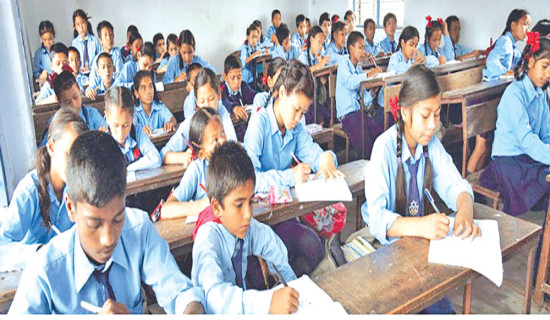- Sunday, 8 February 2026
SEE results out: Over 52% students non-graded
Kathmandu, June 28: Results of the Secondary Education Examination (SEE) 2024 (2080 BS) were published on Thursday.
According to the published by the National Examination Board (NEB), only 47.86 per cent of students passed the exams this year. It means more students failed the exams.
Those who are in the non-graded category cannot get admission in grade 11 until they improve their grading through upgrade examination.
Since 2014, the NEB has been publishing the results in a grading system. But this year, the SEE results were published as per the Letter Grading Guidelines- 2078 BS.
With the implementation of the 'Letter Grading Directives 2078', the details of pass and fail have started appearing in the mark sheets like before 2014.
According to the results, of 464,785 examinees, a total of 242,313 failed or got none-grade (NG).
This year, 231,503 female and 233,270 male students appeared in the SEE. Of them, 114,048 males and 128,257 females failed the SEE.
According to the board, six students got 1.60 to 2 GPA. Similarly, 2,950 students got GPA 2 to 2.40, 41477 students got GPA 2.40 to 2.80, 78,874 students got GPA 2.80 to 3.20 and 68,256 students got GPA 3.20 to 3.60.
Likewise, 31,209 students scored from 3.60 to 4 while 186 students got 4 GPA, the NEB stated. According to the results, 47.87 per cent of the examinees passed while 52.13 per cent failed. Four students from other genders have passed the exam.
The board has also informed that the examination of 220 examinees from 13 different districts has been cancelled.
Province wise results
According to the results, 39,895 of 75,988 candidates from Koshi Province failed the SEE. Similarly, 42,286 out of 79,592 examinees from Madhes Province and 33,842 out of 99,872 examinees from Bagmati Province have failed.
Similarly, out of 40,526 examinees from Gandaki Province, 20,275 students have failed and out of 80,327 from Lumbini Province, 49,224 students failed the key exam.
Likewise, out of 35,034 examinees from Karnali, 20,380 students failed and out of 53,446 from Sudurpashchim, 36, 410 failed.
Upgrade examination
Meanwhile, the grade upgrade exam of SEE is going to be held on August 2 and 3. According to the results released today, 242,000 students have got NG, and of them, 115,834 students will be able to sit in the upgrade examination.
Publishing the results, National Examination Board Chairman Mahashram Sharma said that the students who have NG in two subjects will be allowed to participate in the examination.
According to Sharma, 48,038 students have got NG in one subject and 67,800 students have got NG in two subjects.
Educationist Dr. Biddhyanath Koirala stated that the results were affected because teachers cannot teach according to the interests and needs of the students. Additionally, he noted that students and their guardians do not seem serious about their education.
He suggested not preventing students from enrolling in higher education by labelling them as NG (Non-Grade). Instead, he proposed allowing them to enrol on the condition that they submit their grades in the future within a set target. Dr. Koirala also mentioned that students can excel in areas where they have proficiency.
However, Professor Dr. Mana Wagle hailed the new practice calling it more correct than that was existed in the past. Wagle said whatever the Ministry of Education had done, it had been doing wrong. It made the students very weak. After going to higher education, their performance did not show, it became weaker and weaker.
The Ministry of Education should be thanked for this, Wagle added.
According to Wagle, students have poor performance because they have the confidence that they can enrol in higher classes even if they get lower grades.
The SEE examination was held in mid-March.

















